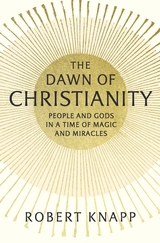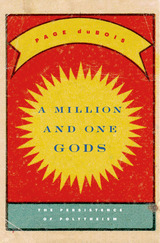
Ordinary people of antiquity interacted with the supernatural through a mosaic of beliefs and rituals. Exploring everyday life from 200 BCE to the end of the first century CE, Robert Knapp shows that Jews and polytheists lived with the gods in very similar ways. Traditional interactions provided stability even in times of crisis, while changing a relationship risked catastrophe for the individual, his family, and his community. However, people in both traditions did at times leave behind their long-honored rites to try something new. The Dawn of Christianity reveals why some people in Judea and then in the Roman and Greek worlds embraced a new approach to the forces and powers in their daily lives.
Knapp traces the emergence of Christianity from its stirrings in the eastern Mediterranean, where Jewish monotheism coexisted with polytheism and prayer mixed with magic. In a time receptive to prophetic messages and supernatural interventions, Jesus of Nazareth convinced people to change their beliefs by showing, through miracles, his direct connection to god-like power. The miracle of the Resurrection solidified Jesus’s supernatural credentials. After his death, followers continued to use miracles and magic to spread Jesus’s message of reward for the righteous in this life and immortality in the next.
Many Jews and polytheists strongly opposed the budding movement but despite major setbacks Christianity proved resilient and adaptable. It survived long enough to be saved by a second miracle, the conversion of Emperor Constantine. Hand in hand with empire, Christianity began its long march through history.

Many people worship not just one but many gods. Yet a relentless prejudice against polytheism denies legitimacy to some of the world’s oldest and richest religious traditions. In her examination of polytheistic cultures both ancient and contemporary—those of Greece and Rome, the Bible and the Quran, as well as modern India—Page duBois refutes the idea that the worship of multiple gods naturally evolves over time into the “higher” belief in a single deity. In A Million and One Gods, she shows that polytheism has endured intact for millennia even in the West, despite the many hidden ways that monotheistic thought continues to shape Western outlooks.
In English usage, the word “polytheism” comes from the seventeenth-century writings of Samuel Purchas. It was pejorative from the beginning—a word to distinguish the belief system of backward peoples from the more theologically advanced religion of Protestant Christians. Today, when monotheistic fundamentalisms too often drive people to commit violent acts, polytheism remains a scandalous presence in societies still oriented according to Jewish, Christian, and Muslim beliefs. Even in the multicultural milieus of twenty-first-century America and Great Britain, polytheism finds itself marginalized. Yet it persists, perhaps because polytheism corresponds to unconscious needs and deeply held values of tolerance, diversity, and equality that are central to civilized societies.
READERS
Browse our collection.
PUBLISHERS
See BiblioVault's publisher services.
STUDENT SERVICES
Files for college accessibility offices.
UChicago Accessibility Resources
home | accessibility | search | about | contact us
BiblioVault ® 2001 - 2024
The University of Chicago Press









